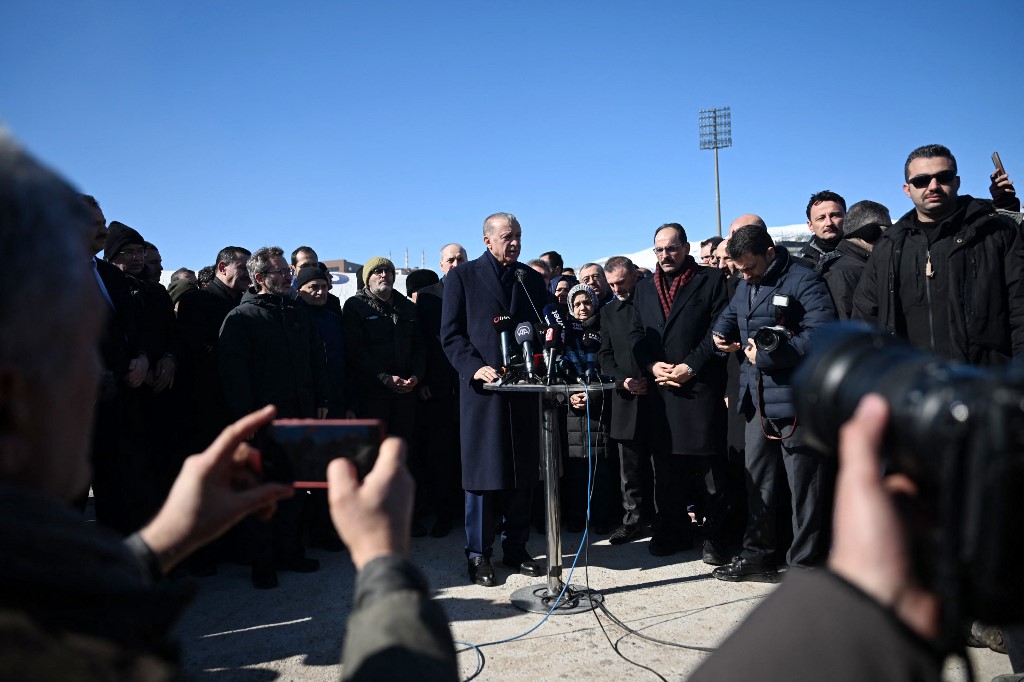A report by the Council of Europe’s (CoE) Safety of Journalists Platform has shown that journalists in Turkey were questioned, intimidated and arrested, while several TV stations were fined due to their critical coverage of the presidential and parliamentary elections in May and two devastating earthquakes that struck Turkey on February 6 of last year.
The report, titled “Press Freedom in Europe: Time to Turn the Tide,” which was released on Tuesday, presents the annual assessment of threats to media freedom and the safety of journalists in Europe in 2023.
The platform aims to reinforce the CoE’s response to threats and member states’ accountability with the report, which assesses major issues undermining press freedom such as threats and intimidation, detention, restrictive legislation, abusive lawsuits, media capture and attacks on public service media.
According to the report after the February earthquakes, journalists dispatched to the devastated towns of southern Turkey were targeted just for doing their job, in circumstances where access to reliable information can be a matter of life and death.
The report also said Turkey’s broadcasting watchdog, the Radio and Television Supreme Council (RTÜK), fined Halk TV and TELE1 5 percent of their annual revenue and FOX TV Türkiye 3 percent “on vague charges,” while suspending the next five episodes of the Halk TV and TELE1 programs that aired criticism of the government’s earthquake preparation and rescue efforts.
Turkey has pursued a wave of arrests targeting pro-Kurdish circles that began in 2022, the report said, with 13 media professionals arrested in a large-scale police operation conducted in 21 Turkish cities, including İstanbul, Ankara and İzmir, for alleged membership in the outlawed Kurdistan Workers’ Party (PKK) – listed as a terrorist group by Turkey and much of the international community – on April 25, in the run-up to the May elections.
Most of them were freed after several days in police custody, while several are awaiting trial risking long prison sentences, according to the report, which added that the ruling Justice and Development Party (AKP) also used its governmental prerogatives to deprive their opponents of fair access to public media.
The platform further stated that national security has been invoked in Turkey to justify the imprisonment of journalists, including on accusations of extremism or terrorism of journalists with alleged links to the PKK.
The report also said vague legal grounds can easily be “weaponized” to censor legitimate forms of expression and public debate in Turkey, referring to the country’s October 2022 law that enacted new grounds for prosecution by introducing prison sentences for disseminating “misleading information” about security, public order and the general health of the country that causes concern, fear or panic.
“Every quarter for the past 20 years, an average of 200 journalists have been brought before the courts under Türkiye’s anti-terrorism legislation or Criminal Code in connection with their work. The ‘lèse-majesté’ provisions have also been used to prosecute journalists on charges of insulting the President,” the platform noted.
Meanwhile, Dunja Mijatović, the CoE commissioner for human rights, appealed to Turkish authorities to change the restrictive framework for freedom of expression and media freedom in a detailed memorandum published on Tuesday.
The memorandum reports on decades of concern about the shrinking space for democratic debate in Turkey and focuses on the judicial harassment of journalists, academics and citizens, criticizing, in particular, the extensive use of the Turkish Penal Code and the Anti-Terror Law to suppress freedom of expression.
President Recep Tayyip Erdoğan’s government came under strong pressure on social media for what his critics saw as a slow response to Turkey’s biggest earthquakes in nearly a century.
The government was mainly accused of failing to mobilize enough people for relief efforts and a lack of coordination among the teams, which resulted in civilians in some regions trying to pull their loved ones from under the rubble themselves and finding them frozen to death although they sustained no critical injuries in the collapse.
The government was also criticized for failing to provide safe shelter for earthquake survivors and meeting their basic needs, although there are ongoing relief efforts in Turkey and overseas for the earthquake survivors.
Rights groups routinely accuse the Turkish government of trying to keep the press under control by imprisoning journalists, eliminating media outlets, overseeing the purchase of media brands by pro-government conglomerates and using regulatory authorities to exert financial pressure, especially since President Erdoğan survived a failed coup in July 2016
Turkey is ranked 165th in the Reporters Without Borders (RSF) 2023 World Press Freedom Index, among 180 countries, not far from North Korea, which occupies the bottom of the list.
